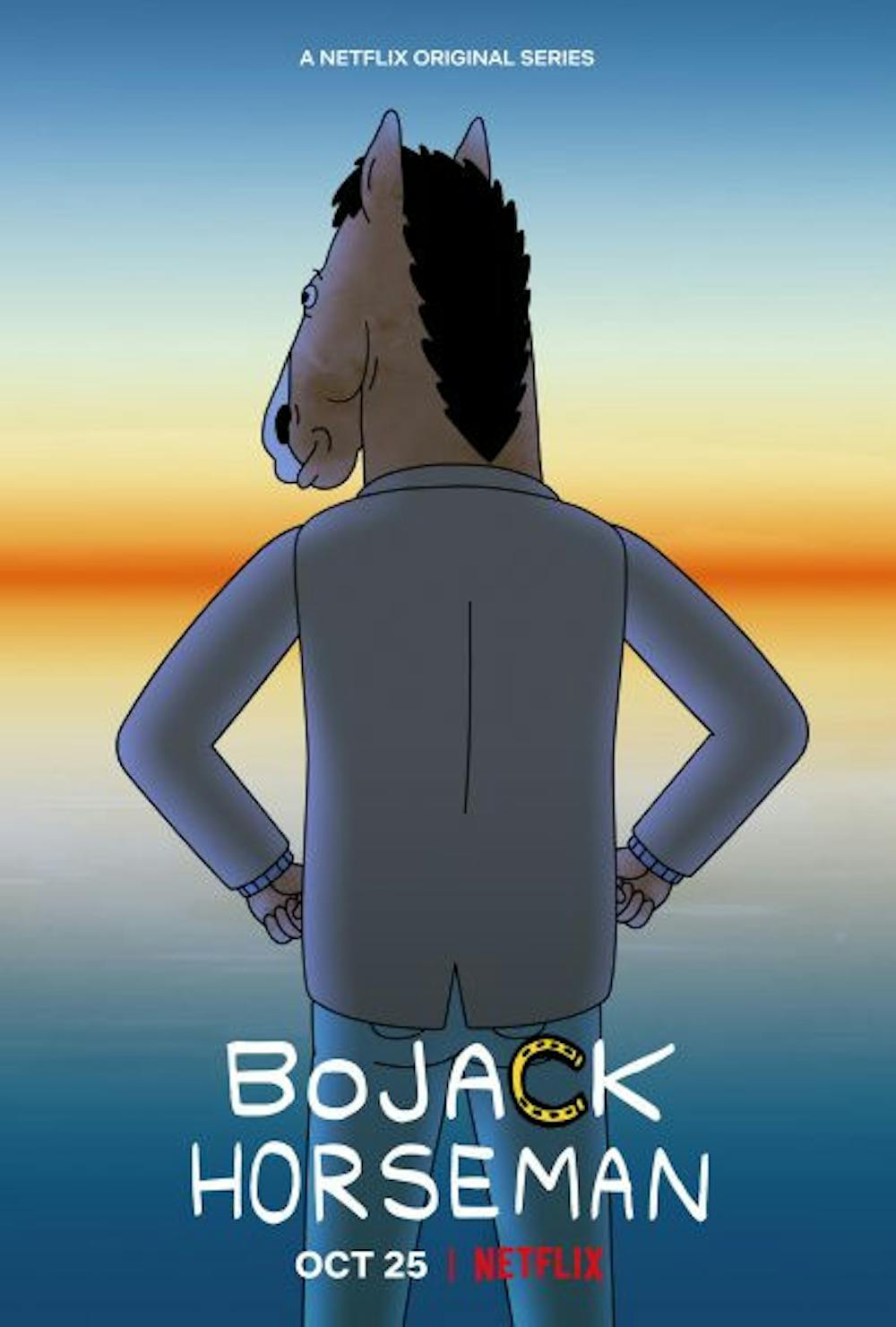“Bojack Horseman” is a show so wholly unlike anything else being made today that it demands immediate viewership. The wacky, zany and often nonsensical show, birthed from the insatiably creative mind of Raphael Bob-Waksber, uses the boundless medium of animation to discuss what is not often discussed honestly: ourselves. The human condition is constantly commented upon, yet somehow this show about an animated horse seems to be the closest to capturing the spirit of life of any show currently airing. The final season of the show has been split into two parts, each containing eight episodes. “Bojack Horseman” season six part II will be released January 2020.
Season six picks up right where it left off, reflecting on Bojack’s (Will Arnett) lowest moment, when the destructiveness of his alcoholism and drug-abuse spilt over to those he held closest. Bojack built his fame in a Full House-esque sitcom called “Horsin’ Around” wherein he played parent to a daughter played by actress Sarah Lynn (Kristen Schaal). As a child actress, Sarah Lynn fell victim to abuse like Bojack turned to a life of drug-abuse. While dealing with his own various self-abuse and drug-abuse problems, Bojack led Sarah Lynn on a wild bender that left her wordlessly passing away in a planetarium. In a show of constant chatter, where it is common to find characters speaking in precisely intricate rhyming sentences, this moment of silence stands apart. Bojack and viewers alike sat in stunned silence at the visual manifestation of his harmful ways, fully internalizing the pain of the moment. Sarah Lynn’s death runs vividly throughout the season, imbuing each and every moment with the weight of this trauma.
At the end of season five, Bojack checked himself into a rehab clinic for his alcoholism and drug-abuse, and though he finds himself flourishing in the clinic community, after six months of treatment he finds himself fearful of re-entering the world he once knew, where the strength of his will would be the only thing keeping him from returning to his self-destructive ways. Unlike previous seasons, which looked back on the past with reminiscent idealism, season six looks at the present as a manifestation of the past, and uses it to try to reconcile with the enormity of Bojack’s’ prior mistakes.
In many ways, season six follows Bojack on his ascension of the 12 steps of Alcoholics Anonymous, first trying to understand the locus of his alcoholism, last trying to make amends with himself and with those around him. With every new episode, viewers are greeted with some earlier rendition of Bojack’s first drink, attempting to find the moment that propelled him in his downward spiral. First, it was after catching his father cheating on his mother with the secretary, then we are told his first drink occurred even earlier, after finding both of his parents passed out after a party, and finally it falling on a later date, when he drinks to cope with the stress of being the face of a popular sitcom. Yet it doesn’t matter which scenario is in fact his first drink, because it is precisely the fact that each drink was precipitated by trauma that is understood to be the problem. Alcohol is often used to treat one’s inner trauma, yet it often results in a myriad of more troubling and destructive situations.
In order to pass step eight of Alcoholics Anonymous, one must make amends to all the persons harmed through the course of alcoholism, and during the course of the season Bojack attempts to seek out all the people in his life who have been affected by his illness. Bojack has always blamed his illness on those around him, using the generous spirits of those who care for him as stilts to keep his head above water, yet now he understands that, in raising himself up, he was also pushing them down. By blaming his alcoholism on others, Bojack continually denied himself change, for substantive change can only come from within. Change is difficult and real change harder still. In seeking out the objects of his abuse, Bojack is constantly greeted by woe and regret. Season six reminds Bojack that the past cannot be rewritten and one simply cannot change what has already happened. He can only beg for forgiveness and hope to retain some of what he once had.
Part I of season six strikes at the epicenter of Bojack’s alcoholism, treating both himself and the viewer through therapy and rehab. “Bojack Horseman” remains one of the few shows that can find its characters delivering a 30 second lyrical rhyming summary one moment and a deeply heartfelt and pathetic monologue the next. There simply isn’t any show quite as outlandish in its methodology, yet it challenges even the best dramas to match is empathetic appeal. “Bojack Horseman” season six finds Bojack struggling for genuineness in his remorse and forgiveness in his friends. Sobering up, both literally and spiritually, is extraordinarily difficult and no show allows its character to fail quite like “Bojack Horseman” does. With part II around the corner, fans of the show, much like the characters within it, sit in a state of gleeful anticipation and sorrowful dread for what the future holds for Bojack and his friends.

Owen Mason-Hill ’22 is the Senior Arts & Culture Editor.
He previously served as a staff columnist, writing film reviews under the Reel Critic column. Mason-Hill is studying for a Film and Media Culture major, focusing his studies on film criticism and videographic essays.
His coverage at The Campus focuses primarily on film criticism, and has expanded to encompass criticism of other mediums including podcasts, television, and music under his column “Direct Your Attention.”




